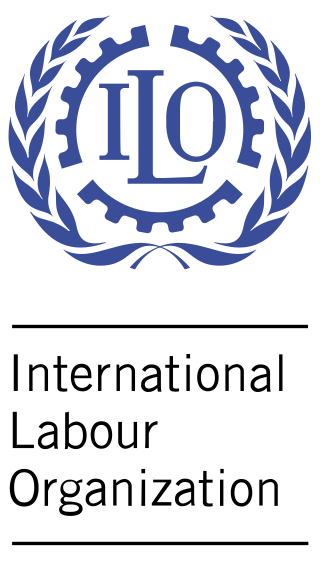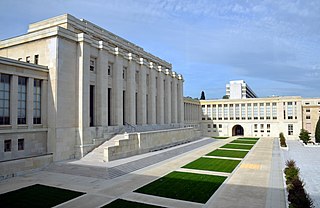
The International Labour Organization (ILO) is a United Nations agency whose mandate is to advance social and economic justice by setting international labour standards. Founded in October 1919 under the League of Nations, it is one of the first and oldest specialized agencies of the UN. The ILO has 187 member states: 186 out of 193 UN member states plus the Cook Islands. It is headquartered in Geneva, Switzerland, with around 40 field offices around the world, and employs some 3,381 staff across 107 nations, of whom 1,698 work in technical cooperation programmes and projects.

The United Nations System consists of the United Nations' six principal bodies, the Specialized Agencies and related organizations. The UN System includes subsidiary bodies such as the separately administered funds and programmes, research and training institutes, and other subsidiary entities. Some of these organizations predate the founding of the United Nations in 1945 and were inherited after the dissolution of the League of Nations.
Labor rights or workers' rights are both legal rights and human rights relating to labor relations between workers and employers. These rights are codified in national and international labor and employment law. In general, these rights influence working conditions in the relations of employment. One of the most prominent is the right to freedom of association, otherwise known as the right to organize. Workers organized in trade unions exercise the right to collective bargaining to improve working conditions.

The World Confederation of Labour (WCL) was an international labour organization founded in 1920 and based in Europe. Fascist governments of the 1930s repressed the federation and imprisoned many of its leaders, limiting operations until the end of World War II. In 2006 it became part of the International Trade Union Confederation (ITUC), ending its existence as an independent organization.
The Global Policy Forum (GPF) is an international non-governmental organization founded in December 1993 and based in New York and Bonn . The aim of the Global Policy Forum is to critically accompany and analyze developments in the United Nations and on the topic of global governance. Thereby a bridge between the international and the local level is to be built. GPF seeks to strengthen intergovernmental organizations and promote multilateralism based on solidarity, international law, and the United Nations Charter. The Global Policy Forum also has consultative status on the United Nations Economic and Social Council. Jens Martens has been the GPF's executive director since 2014 and director of GPF Europe since its foundation in 2004.

Decent work is employment that "respects the fundamental rights of the human person as well as the rights of workers in terms of conditions of work safety and remuneration. ... respect for the physical and mental integrity of the worker in the exercise of their employment."
Migrant domestic workers are any persons "moving to another country or region to better their material or social conditions and improve the prospect for themselves or their family," engaged in a work relationship performing "in or for a household or households."

The European Metalworkers' Federation (EMF), founded in 1971, is a federation of 68 metalworkers' unions from 31 countries, representing a combined total of 6.5 million affiliates. It is based in Brussels, Belgium, the general secretary is Ulrich Eckelman and Bart Samyn is the Deputy General Secretary. The organisation was dissolved on 15 May 2012, to become a part - together with EMCEF and ETUF-TCL - of the newly created organisation industriAll European Trade Union on 16 May 2012

The International Social Security Association (ISSA) is an international organization bringing together national social security administrations and agencies. Founded in 1927, the ISSA has more than 330 member organizations in 158 countries. It has its headquarters in Geneva, Switzerland, in the International Labour Office (ILO).

An international organization, also known as an intergovernmental organization or an international institution, is an organization that is established by a treaty or other type of instrument governed by international law and possesses its own legal personality, such as the United Nations, the World Health Organization, International Union for Conservation of Nature, and BRICS. International organizations are composed of primarily member states, but may also include other entities, such as other international organizations, firms, and nongovernmental organizations. Additionally, entities may hold observer status.

The International Forestry Students’ Association (IFSA) is an international network of students in forestry-related sciences. It is a globally organized and locally operated student organisation connecting forest and related science students to peers, forest-related organisations, and policy platforms. The IFSA has 130 member associations in over 50 countries. IFSA is a non-political, non-profit, and non-religious organisation that is entirely run by students.
The United Nations Global Initiative to Fight Human Trafficking (UN.GIFT) is a multi-stakeholder initiative providing global access to expertise, knowledge and innovative partnerships to combat human trafficking.
The Global Forum on Migration and Development (GFMD) is a state-led, informal and non-binding process, which helps shape the global debate on migration and development. It provides a flexible, multi-stakeholder space where governments can discuss the multi-dimensional aspects, opportunities and challenges related to migration, development, and the link between these two areas. The GFMD process allows governments - in partnership with civil society, the private sector, the UN system, and other relevant stakeholders – to analyze and discuss sensitive issues, create consensus, pose innovative solutions, and share policy and practices.
International labour law is the body of rules spanning public and private international law which concern the rights and duties of employees, employers, trade unions and governments in regulating Work and the workplace. The International Labour Organization and the World Trade Organization have been the main international bodies involved in reforming labour markets. The International Monetary Fund and the World Bank have indirectly driven changes in labour policy by demanding structural adjustment conditions for receiving loans or grants. Issues regarding Conflict of laws arise, determined by national courts, when people work in more than one country, and supra-national bodies, particularly in the law of the European Union, have a growing body of rules regarding labour rights.
The International Association of Economic and Social Councils and Similar Institutions, an association under Dutch law, is established in Brussels, Belgium and has been founded on 1 July 1999, in Port Louis, Mauritius.

The Global Apprenticeship Network (GAN) is a Swiss independent and neutral not-for-profit association based in Geneva. The GAN is a network of companies, employer organisations, associations and international organisations with the mission of promoting quality apprenticeships and the goal of creating job opportunities for youth and ensuring skills for business.

The International Training Centre of the International Labour Organization (ITCILO) is the training arm of the International Labour Organization (ILO). It runs training, learning and capacity development services for governments, employers' organizations, workers' organizations and other national and international partners in support of Decent Work and sustainable development. It is part of the United Nations System.

Shea Gopaul is the Permanent Representative to the United Nations in New York for the International Organisation of Employers (IOE). She is also the Founder and former Executive Director Emeritus of the Global Apprenticeship Network (GAN), a coalition of companies and organizations addressing the skills mismatch and youth unemployment.
The Indonesian Employers’ Association (APINDO) is the representative of business world established on January 31, 1952, under leadership of the National Board (DPN) located in Jakarta, Provincial Boards in 34 provinces and approximately 350 Cities/Regencies Boards all over Indonesia.










